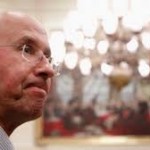[Last night, the Ottawa Writers Festival took me on a road trip to Rwanda with Canadian humorist Will Ferguson. Wait. What? Rwanda? Humour? Yes, both, and it was superb. SPOILER ALERT: Rwanda has more to it than machetes and murder. (Gorillas. Mountains. Peace. Progress. More females in government than in your country.) Rwandans laugh. They remember. They change. It’s not still 1994 there, even if it is in most of our minds. But speaking of thought, I haven’t even told you about the previous WriteFest journey I went on, which stayed much closer to home.]
Speaking of public radio, and public spaces, and public service – as often happens around my little corner of the globe – I was in a sacred place last week where service to the common good was extolled with the help of a radio star that video couldn’t kill. (It probably helps that Alan Neal might be part hobbit.)
The SPACE: Centretown United Church is a lovely old stone building about 10 bus stops from Canada’s Parliament. Churches give some people the creeps, sometimes with good reason – desperately resisting the temptation here to mention what happened in Rwandan churches – but the UC is a benevolent and remarkably open-minded Canuck institution, and this place gets a different but complementary dose of the sacred whenever the Ottawa Writers Festival takes it over. Stained glass, hard benches, bright light at sundown, elevated and inspiring conversation. And BOOKS. (Another flavour of heaven, though as my father-in-law muttered afterward, “I don’t know what Pierre Berton was thinking when he called his book The Comfortable Pew. Had he ever sat on one of these things?” Irony can be fun.)
The RADIO: An interview with the evening’s author had already been done on CBC Radio 1’s local afternoon show, but the cherubic and funny Alan Neal was glad to recapitulate his conversation with Kevin Page for a live, though clearly greying, audience. It was like public radio in a really big studio, and was punctuated by the duo’s mock competitition to see who could insert more promos: the host at “All-in-a-Day-at-91.5-FM-in-Ottawa” or the writer “flogging my book Unaccountable”. I declared a tie. They made a good comedy team in the context of what could have been a very dry and earnest conversation. It gave bureaucrats (and public radio) a good name.
The PUBLIC SERVICE and its SERVANT. Kevin Page became an unlikely centre to a surprising storm of Canadian attention. A self-professed “bean-counter”, this long-time economist within the Canadian federal public service became Canada’s first Parliamentary Budget Officer in 2008. “Nobody else wanted the job,” he claims. It would seem to be a rather grey and readily-ignorable position; certainly, the sitting government during his tenure would have preferred that it remain so.

